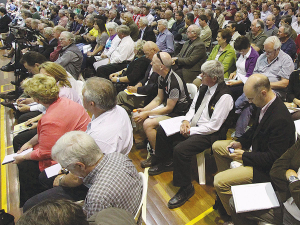94% of NZ farmers oppose Paris Agreement, survey shows
A survey of 2000 farmers shows 94% of respondents believe that remaining in the Paris Agreement for climate change is not in the country's best interest.
 More than 400 farmers attended a recent series of Groundswell NZ meetings around Canterbury and the West Coast.
More than 400 farmers attended a recent series of Groundswell NZ meetings around Canterbury and the West Coast.
More than 400 farmers attended a recent series of Groundswell NZ meetings around Canterbury and the West Coast to discuss new freshwater and biodiversity rules being imposed on the farming sector.
"We have been blown away by the farmer engagement at our meetings," says Groundswell spokesman and Otago farmer Bryce McKenzie.
Farmer and environmentalist Jane Smith, a former Ballance Farm Environment Award winner, was one of the key speakers at the meetings. She told farmers to not just accept everything that is put in front of them.
"Once regulations are enshrined in law, they will be with us forever - while those who enact them will come and go," Smith told the meetings.
She also believes that the farming sector needs one, strong voice.
“Our advocacy spokespeople need to be listening to grassroots farmers and not simply appeasing idealistic lawmakers.”
Smith also questioned why the Government seemed hell-bent on destroying the NZ farming sector when NZ farmers are the most efficient sustainable food producers in the world.
She says a more pragmatic pathway to good environmental outcomes, without destroying the fabric of NZ’s rural society, included working alongside regional councils to ensure commonsense prevails and the inter-generational, communal work underway – driven by catchment groups – is not undermined by an “outlandish generic consent process”.
The other key speaker, Jamie McFadden, of the Rural Advocacy Network based in Canterbury, explained the implications of the proposed freshwater and indigenous biodiversity regulations.
McFadden says these regulations are “unworkable” and would deliver outcomes that will be worse for the country’s natural environment and waterways.
He told the meetings there are more simple solutions available to NZ’s environmental issues – such as operating under one, integrated legislation.
Following these meetings, McKenzie says Groundswell is looking at implementing a range of actions to put a stop to the regulations.
“We are currently looking for regional coordinators to help us share information and keep farmers informed as more protest actions unfold,” he says. “Groundswell is already well established in Southland/Otago and coordinators for the West Coast are now underway.”
The Meat Industry Association of New Zealand (MIA) today announced that Chief Executive Officer Sirma Karapeeva has resigned from the role.
The winners of the 2026 Hawke’s Bay/Wairarapa Dairy Industry Awards were announced at the annual awards dinner held at Copthorne Solway Park in Masterton on Thursday evening.
Environment Southland is welcoming this week’s decision by the Environmental Protection Authority (EPA) to approve the release of Blaptea elguetai, a leaf‑feeding beetle that will help control the highly invasive Chilean flame creeper.
This March, the potato industry is proudly celebrating International Women’s Day on 8 March alongside the International Year of the Woman Farmer, recognising the vital role women play across every part of the sector — from paddocks and packhouses to research, leadership, and innovation.
Fruit trader Seeka posted a record profit and returns to shareholders in 2025.
Recent weather events in the Bay of Plenty, Gisborne/Tairawhiti, and Canterbury have been declared a medium-scale adverse event.

OPINION: A mate of yours truly reckons rural Manawatu families are the latest to suffer under what he calls the…
OPINION: If old Winston Peters thinks building trade relations with new nations, such as India, isn't a necessary investment in…